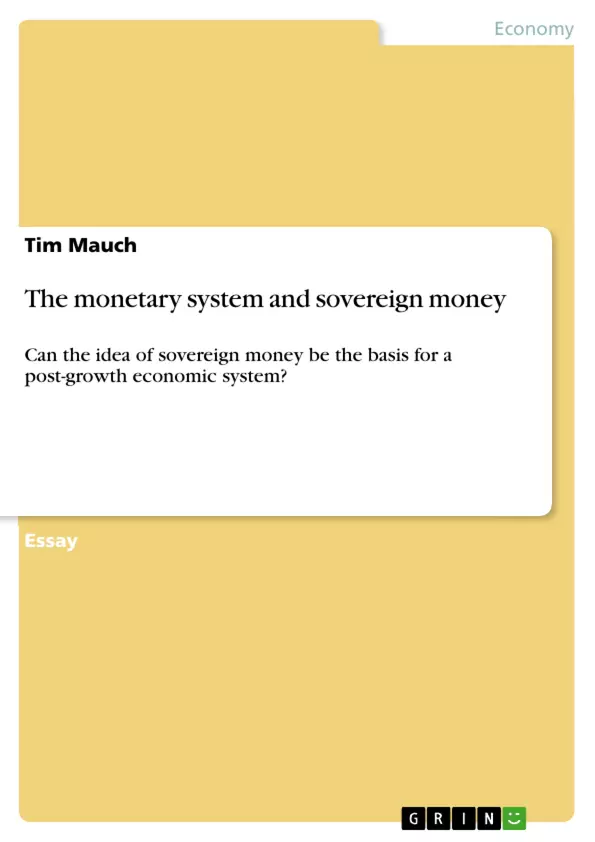According to the rising demand of sustainable economic models, based on the increasing awareness that our planet cannot withhold the current pressure of the continuous economic growth, this essay raises the question whether our current monetary system creates a growth imperative and if sovereign money is an alternative to overcome this growth imperative. The essay gives an introduction into the function of the two-tier, fractional reserve banking system and reflects the consequences of the “money creation privilege” of modern private banks. Moreover, it is discussed if and how this system creates a growth imperative in our economic system.
Therefore, the neutrality theory of money is criticized as well as the common idea that interest creates growth. Furthermore, the pro-cyclical behavior of private banks and the lack of control of central banks is
discussed as a possible reason for growth imperative. Still as a result there is no systemic necessity to growth based on the monetary system. The monetary system is not a driving condition of the economic growth, but it lays the necessary basis for growth. The essay concludes that it is questionable that the growth imperative can be avoided with sovereign money, especially because the causality goes from economic growth to money creation and not vice versa.
Inhaltsverzeichnis (Table of Contents)
- 1 INTRODUCTION
- 2 THE MONETARY SYSTEM
- 2.1 HOW THE MONETARY SYSTEM DOES NOT WORK
- 2.2 HISTORY OF MONETARY SYSTEM
- 2.2.1 THE MONEY CREATING PROCESS
- 2.2.2 CENTRAL BANKS
- 2.3 FINANCIAL SYSTEM TODAY
- 3 MONEY AND GROWTH
- 3.1 MONEY CREATION AND GROWTH
- 3.2 IS THERE A GROWTH IMPERATIVE?
- 4 SOVEREIGN MONEY
- 4.1 THE BASIC IDEA OF SOVEREIGN MONEY
- 4.2 CONCLUSION: CAN SOVEREIGN MONEY DECREASE THE GROWTH IMPERATIVE?
- 5 QUOTES
Zielsetzung und Themenschwerpunkte (Objectives and Key Themes)
This essay explores the relationship between our current monetary system and the growth imperative within our economy. It aims to examine whether the existing system inherently promotes continuous growth and if sovereign money could be a potential solution to overcome this growth imperative.
- The function of the two-tier, fractional reserve banking system
- The consequences of the "money creation privilege" of private banks
- The impact of the monetary system on economic growth
- The potential of sovereign money to decrease the growth imperative
- The neutrality theory of money and the role of interest in creating growth
Zusammenfassung der Kapitel (Chapter Summaries)
The introduction highlights the pressing need for sustainable economic models in light of planetary boundaries. It examines the relationship between our current economic system, driven by continuous growth, and the concept of "overshoot." The essay then introduces the monetary system, explaining the mechanics of the multiplier model and highlighting its limitations in representing the complexity of the system.
The second chapter delves deeper into the history of the monetary system, tracing the evolution of money creation from goldsmith notes to fractional reserve banking. It examines the role of central banks and the potential for "bank runs" due to a lack of trust in the system.
The third chapter focuses on the connection between money creation and economic growth. It discusses whether the current system creates a growth imperative and explores arguments against this claim. The chapter also examines the potential impact of private bank pro-cyclical behavior and the limitations of central bank control on the growth imperative.
The fourth chapter introduces the concept of sovereign money as an alternative approach to the current system. It outlines the basic idea of sovereign money and investigates its potential effectiveness in reducing the growth imperative.
Schlüsselwörter (Keywords)
The essay focuses on key concepts related to the monetary system, economic growth, and sustainable development. These include the two-tier fractional reserve banking system, money creation privilege, growth imperative, sovereign money, planetary boundaries, post-growth economy, and the neutrality theory of money.
Frequently Asked Questions
What is fractional reserve banking?
It is a system where private banks can create money by lending out a multiple of their actual reserves, often referred to as the "money creation privilege."
Does the monetary system create a growth imperative?
The essay discusses whether the need for interest payments and bank behavior forces continuous economic growth, concluding it provides the basis but isn't the sole driver.
What is the basic idea of sovereign money?
Sovereign money (Vollgeld) proposes that only central banks should have the right to create money, removing this power from private commercial banks.
Can sovereign money stop the growth imperative?
The essay argues it's questionable, as the causality often flows from economic growth to money creation rather than vice versa.
What are "planetary boundaries" in this context?
They refer to the ecological limits of Earth that are pressured by continuous economic growth, necessitating more sustainable economic models.
- Citar trabajo
- Tim Mauch (Autor), 2019, The monetary system and sovereign money, Múnich, GRIN Verlag, https://www.grin.com/document/471291



